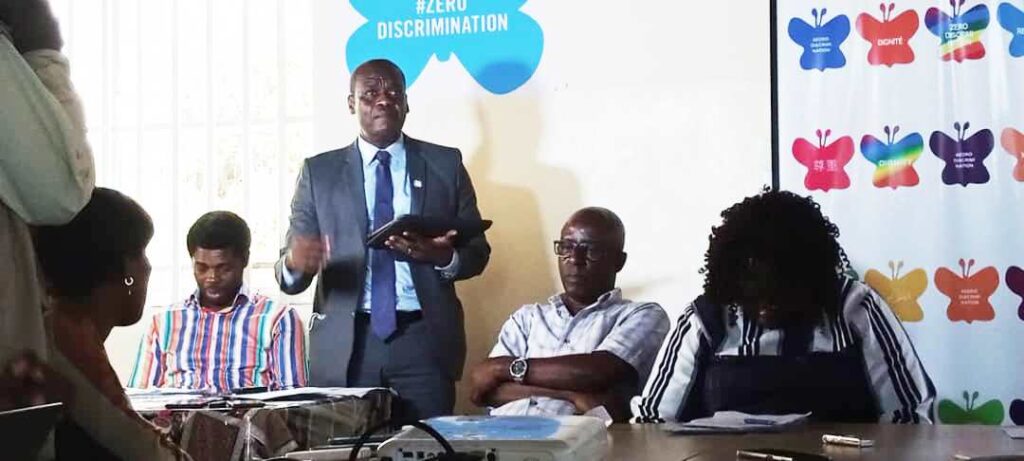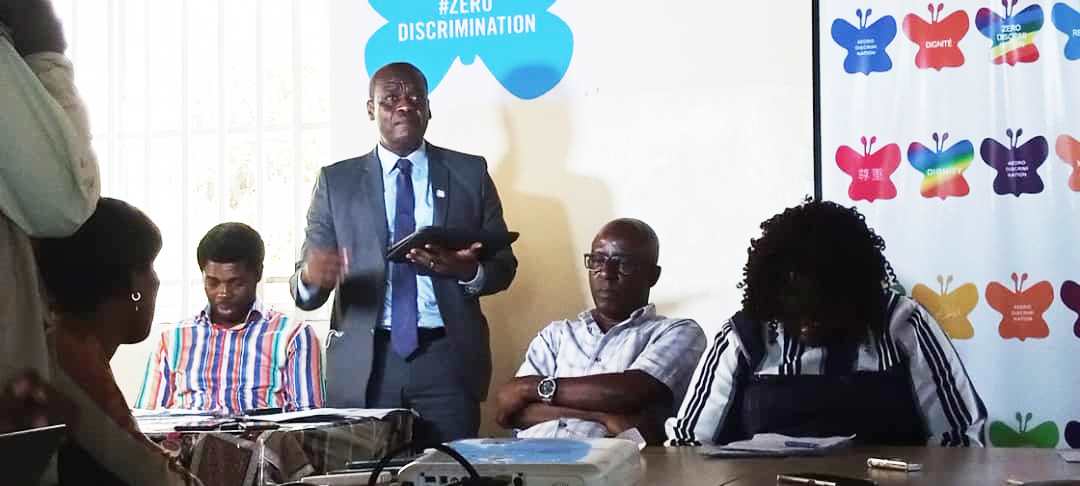By Janet A Sesay
The National AIDS Secretariat (NAS) in collaboration with UNAIDS and other health partners around the world has celebrated “Zero Discrimination Day”.
The theme for this year’s celebration is: “Remove laws that harm, create laws that empower”.The event took place on Tuesday, March 1, 2022, at the NAS head office at Bell Air Park, Dwazark in Freetown.
Delivering his keynote address, the UNAIDS country director Isaac Ahemesah said Zero Discrimination Day highlights the urgent need to take action against discriminatory laws.
He said in many countries laws result in people being treated differently, excluded from essential services or subjected to undue restrictions on how they live their lives ‘simply because of who they are, what they do or who they love’.
He maintained that such laws are discriminatory and they deny human rights and fundamental freedoms.
Ahemesah said states have a moral and legal obligation to remove discriminatory laws and to enact laws that protect people from discrimination.
‘Everyone has a responsibility to hold states accountable, call for change and contribute to efforts to remove discriminatory laws,’ he said.
He said on Zero Discrimination Day, they celebrate the right of everyone to live a full and productive life, ‘and live it with dignity and free from discrimination’.
He continued that the World Health Organisation (WHO) is highlighting the right of all people to live healthy, full and productive lives with dignity regardless of their HIV, viral hepatitis or sexually transmitted infection status.
He said it is vital to address stigma and discrimination in health care settings including for men who have sex with men, sex workers, people who use drugs, people in prison and transgender people to end epidemics of HIV, viral hepatitis and STIs.
The NAS director Abdul Rahman Sesay said discrimination is not only against people living with AIDS, but key population including people living with disabilities also suffer discrimination as they face challenges with many issues relating to the response to HIV/AIDS.

Sesay said he strongly believes that if they don’t address those issues they will not be able to progress because most of those issues have to do with stigma and discrimination which they have been complaining about.
He said the country’s key populations are very critical, and are considered the drivers of the epidemic.
He revealed that the national prevalence rate for the general population is 1.7 per cent and the country’s laws are not encouraging; even though they have been trying their best to do more, they are however cut off by the law, a reason he said they want those laws to be reviewed.
‘If we are to address the issue of HIV/AIDS in Sierra Leone, and also to provide services to everybody irrespective of the sub-population group people belong to, we need to ensure that we begin to raise awareness and advocacy work so that some of our laws can be reviewed,’ Sesay stated.
He furthered that the health sector also has a critical role to play through generating data on how stigma and discrimination impact populations, mostly people affected by HIV, viral Hepatitis and sexual transmitted infections.
He said the health sector also plays an important convening role for multi-sectoral partnership to address the broader determination of health.
Habib Taigore Kamara, executive director for Social Linkages for Youth Development and Child Link (SLYDCL), said Zero Discrimination Day highlights how people can become informed about and promote inclusion, compassion and peace, and above all movement for change.
He furthered that Zero Discrimination Day is helping to create a global movement of solidarity to end all discrimination.
Kamara said decriminalisation is not an end goal rather it is a means towards ensuring justice and protecting human rights which can build non-stigmatisation of victims.
He said SLYDCL is advocating to; raise awareness of the harm caused by decriminalisation of people who use drugs and call on the government through the Human Rights Commission for the review of the 2008 National Drug Control Act, which now makes provisions for Harm Reduction Intervention.
Marie Benjamin, chairperson of CARKAP in her statement said their organisation’s focus is on populations like sex workers, men having sex with men, women, adolescents and minors.
She said ‘This is a very important day that helps to remove laws that stigmatise people and help create laws against stigma.’
She said there is lots of discrimination like sexual molestation and on this day they are looking at a call to action partners can do in terms of looking at the laws, trying to remove laws that discriminate against people and how to change laws to empower them instead.
Komba Fillie, advocacy and communication officer, NETHIPS said this day is a day of reflection in terms of removing laws that are harmful especially in managing and response.
He said they want people to look at discrimination as not acceptable in society especially in the area of HIV.
He said there are so many issues that lead to discrimination and stigma which have been the bedrock of what they are trying to overcome.
Fillie noted that discrimination are issues that occur within our environment like the health facility, places of work; and this has actually been a challenge they are trying to address by partnering with NAS and others.
He said in handling discrimination there are laws in which if anyone is caught discriminating against an infected person or even attempting to do so, that person is liable to a jail term of five years or a fine of twenty million leones (Le20,000,000).
He said that punishment is domestic punishment because stigma leads to discrimination and stigma itself is thinking negative thoughts within one self and that discrimination has led to serious problems especially in health facilities.
Komba said NETHIPS is recommending for partners in health to ensure that if a health worker is caught in stigma or discrimination their licence should be seized from them.


